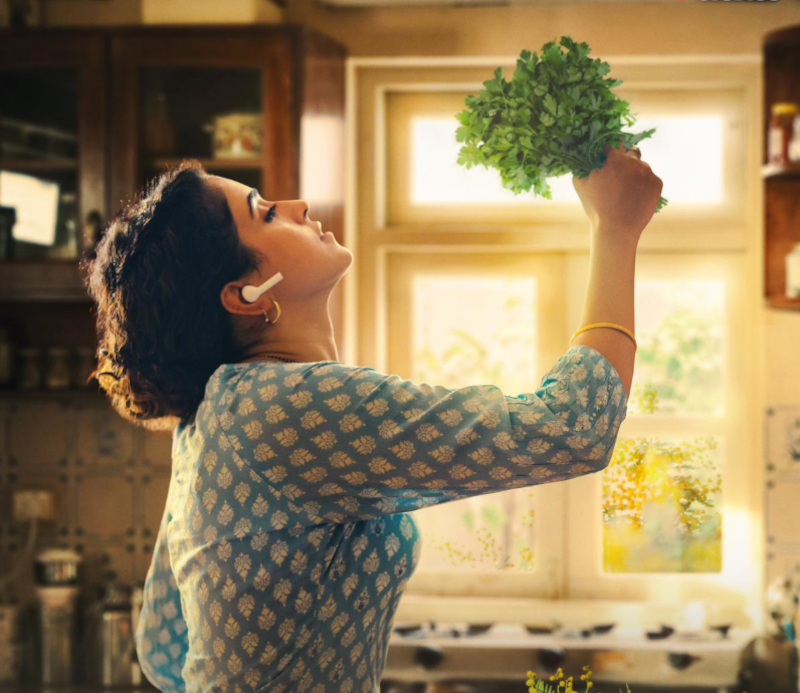Director – Arati Kadev – 2023 – India – Cert. none – 111m
****
After getting married, a woman is expected to work cheerfully from dawn to dusk, waiting on the menfolk of the house hand and foot – premieres in the Critics’ Picks Competition at the 27th Tallinn Black Nights Film Festival
This is the Hindi remake of Malaysian film The Great Indian Kitchen (Jeo Baby, 2021).
It starts off cheerfully enough with a big song and dance routine with lots of percussion instruments in which the heroine Richa (Sanya Malhotra), who we later learn is a keen amateur choreographer, shows off various Bollywood dance moves in sync with her fellow dancers. You wouldn’t know it from the cleverly constructed trailer, but there are surprisingly few song and dance routines overall for a Bollywood production – the only two complete numbers take place right at the start and right at the end, with the film’s running length at just under two hours a lot shorter than your average, three hour, Bollywood epic which tends to interrupt the action for a song every five minutes. In that sense, the whole thing feels surprisingly Western.
In another sense, the first hour or so doesn’t feel Western at all. Richa’s parents invite a nice Indian man Diwakar (Nishant Dahiya), a doctor specialising in female anatomy, over to their house with his parents to meet her. He and they seem very nice, and she makes a big hit when she tells him the house’s wi-fi password, the memorable A1B2C3D4E5F6, although the fact that he seems a bit slow to take in just how simple (and, indeed, clever) this password is ought perhaps to serve as some sort of warning that he’s never had to do much for himself, that it’s all been done for him to make his life easy. And that he might therefore not be a very good match.
But no, she goes through a lavish Indian wedding ceremony – a truly wondrous and colourful feast for the eyes as only the Indians know how –- and moves into his and his parents’ house. For the first few days, everything seems wonderful as she works alongside her mother-in-law in the kitchen preparing food for the menfolk, with food for the women themselves almost feeling like an irrelevant afterthought. However, she’s there to serve her husband.
Now, perhaps such sentiments are common in Indian cinema and Indian society – I honestly haven’t seen enough Indian cinema to say one way or the other – but they are so far removed from current Western ideas about men and women being given equal opportunity in life, which I guess I’ve grown up with, attempted to live out, and to which I subscribe on an almost subliminal level, that at this point I pretty quickly started to dislike the film.
If a father-in-law can taste whether the contents of the bowl have been made in a food mixer or crushed with a stone roller, because as well as being much, much harder work, the latter apparently tastes far better, it just seems too appallingly sexist. And if all the women present think that’s okay without even batting an eyelid, then that’s even worse.
The Indian food prepared on the screen looks fantastic, and you wish this movie was produced in a format where you could not just see but also smell the food; we’re talking serious food porn here. But then the joint misogyny of the men that want to be waited on hand and foot by their womenfolk in the home repels the Western viewer just as much as the incredible looking food attracts them.
Richa begins to pick up our sympathy as she starts, little by little, to rebel – there’s a great scene where she uses her mobile phone to watch her old social media dance videos in the kitchen and dances around while preparing a meal, yet mostly, her work in the kitchen (without labour-saving devices) takes up all her time, and she has no time left to work on her dance moves.
All this is succinctly expressed by a leaking pipe under the kitchen sink which, we are told, could only be fixed by replacing the premises’ entire plumbing system. As a diagnosis of faulty plumbing, that’s almost certainly hogwash. Be that as it may, the leak gets progressively worse as the woman gets more and more stressed.
To improve things, she applies for a part-time job teaching dance at a local dance academy, but when her father-in-law learns of this, as her legal guardian now that she is his daughter-in-law, he forbids it.
The more she considers or attempts to rebel against her appalling domestic circumstances, the more I started to warm to the movie. When she eventually finds a way to resolve her situation, her new family get their comeuppance, which proves deeply satisfying for the audience.
There’s a further subplot about the inadequacy of the couple’s sex life, to the effect that her husband wants to get her pregnant while she’s ovulating, yet seems to lack any concept of a woman receiving any pleasure from the sex act. It’s just a nightly routine of him pumping her while she lies back and puts up with it. If he’s a doctor specialising in female anatomy, it’s hard to believe he can get something as basic as this wrong. Maybe marriage in India really is this awful for many women.
Mrs.premieres in the Critics’ Picks Competition at the 27th Tallinn Black Nights Film Festival which runs in cinemas from Friday, November 3rd to Sunday, November 19th.
This article originally appeared on DMovies.org: you can find it here.
Trailer:
